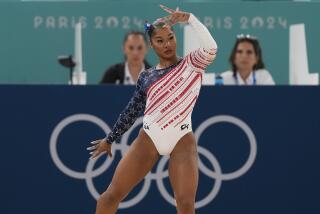Hamm Keeps Olympic All-Around Gold Medal
- Share via
U.S. gymnast Paul Hamm can keep the gold medal he won in the men’s all-around event at the Athens Olympics, a sports tribunal ruled Thursday in Lausanne, Switzerland.
Nearly two months after the close of the 2004 Games, the Court of Arbitration for Sport, in a case brought by South Korean gymnast Yang Tae Young and the South Korean Olympic Committee, said that the rules of gymnastics required protests of an alleged judging error to be made during the competition, and that Yang would have to be satisfied with bronze.
Mistakes happen, but without evidence of corruption in the judging, an event has to be over when it’s over, the panel said.
“Finality is, in this area, all important,” the panel ruled. “Rough justice may be all that sport can tolerate.”
Hamm, 22, a native of Waukesha, Wis., the first American to win the men’s all-around, said in a teleconference with reporters, “This is obviously a great day for me,” adding that the decision confirmed “what I always felt in my heart, that I was the champion that night and I am the Olympic all-around gold medalist.”
Hamm added, “There’s been a lot of fighting for this medal. I felt like I won it three times already: in the competition, with the media and, finally, in the court.”
Asked whether Hamm had lost marketing or promotional opportunities because of the controversy, his business manager, Sheryl Shade, said he had been left off Wheaties boxes, a traditional American homage to sports heroes.
“We would obviously like to re-investigate that and see if it’s a possibility,” she said.
The situation has also strained the relationship between Hamm and officials at USA Gymnastics, and between Hamm and the international gymnastics federation, which goes by the acronym FIG.
“That’s one thing I would really love to have, is an apology from FIG,” Hamm said. “I would love that. I don’t know if it’s going to happen, necessarily.”
The controversy also has sparked pressure on FIG to reform its scoring system -- much as figure skating officials reformed their sport’s system after a judging scandal at the 2002 Salt Lake City Winter Games.
Giselle Davies, spokeswoman for the International Olympic Committee, said the IOC was “pleased” with Thursday’s ruling, adding, “ ... the IOC also openly expressed concern about judging problems during the Games, and confirmed that it would work with FIG to improve this.”
Said Peter Ueberroth, chairman of the U.S. Olympic Committee’s board of directors: “This issue should not have had to go through this process but it did and we’re glad with the way it was resolved.”
Hamm won the gold Aug. 18 after a spectacular final performance on the high bar, rallying from 12th place with only two events left, and after a scoring error had cost Yang a crucial one-tenth of a point.
Judges mistakenly gave Yang’s routine a start value -- a degree of difficulty -- of 9.9, not 10, the maximum score for a perfect routine.
In the closest men’s all-around finish in Olympic history, Yang finished .049 of a point behind Hamm.
The deducted tenth of a point would have put Yang .051 ahead of Hamm. As it was, Hamm took the gold, Yang bronze and another Korean, Kim Dae Eun, the silver.
FIG suspended the judges who made the mistake but refused to change the results, saying the Koreans had not filed their protest on time.
In a gesture of goodwill, the USOC initially considered a proposal to share duplicate gold medals.
According to the Court of Arbitration for Sport, U.S. Olympic Committee and Korean Olympic Committee officials met with the IOC on Aug. 22 and “proposed that two gold medals be awarded.” IOC President Jacques Rogge said no, adding that if FIG wished to change the scores and “re-allocate the medals,” the IOC would “respect” the federation’s action.
Then, however, on Aug. 26, Bruno Grandi, the federation president, asked Hamm to give up the gold, saying, “The true winner of the all-around competition is Yang Tae Young.”
The USOC said that was insulting and that any talk of two medals was over.
Yang and the Korean Olympic Committee appealed to the Court of Arbitration for Sport, which held a full-day hearing on Sept. 27 in Lausanne.
The decision ends the legal wrangling -- there can be no further appeal -- and apparently was designed to blunt an emerging trend toward protest and litigation over Olympic judging controversies. For years, the Court of Arbitration for Sport, the Olympic movement’s court of last resort, has sought to establish that controversies on the field of play are not the stuff of lawsuits.
“Hopefully, this will reduce the number of field-of-play decisions that go to CAS in the first place,” said Howard Jacobs, a Westlake Village attorney and one of the leading sports lawyers in the United States.
Said Penn State professor Charles Yesalis, a longtime observer of the Olympic movement, “You have to have the contest decided on the field -- so when fans leave the stands, they know who wins, and it’s final.”
Moreover, sports federations and national Olympic committees could hardly afford to regularly litigate such cases. The USOC, for instance, has spent more than $300,000 in lawyer and other costs related to the Hamm matter.
More to Read
Go beyond the scoreboard
Get the latest on L.A.'s teams in the daily Sports Report newsletter.
You may occasionally receive promotional content from the Los Angeles Times.






